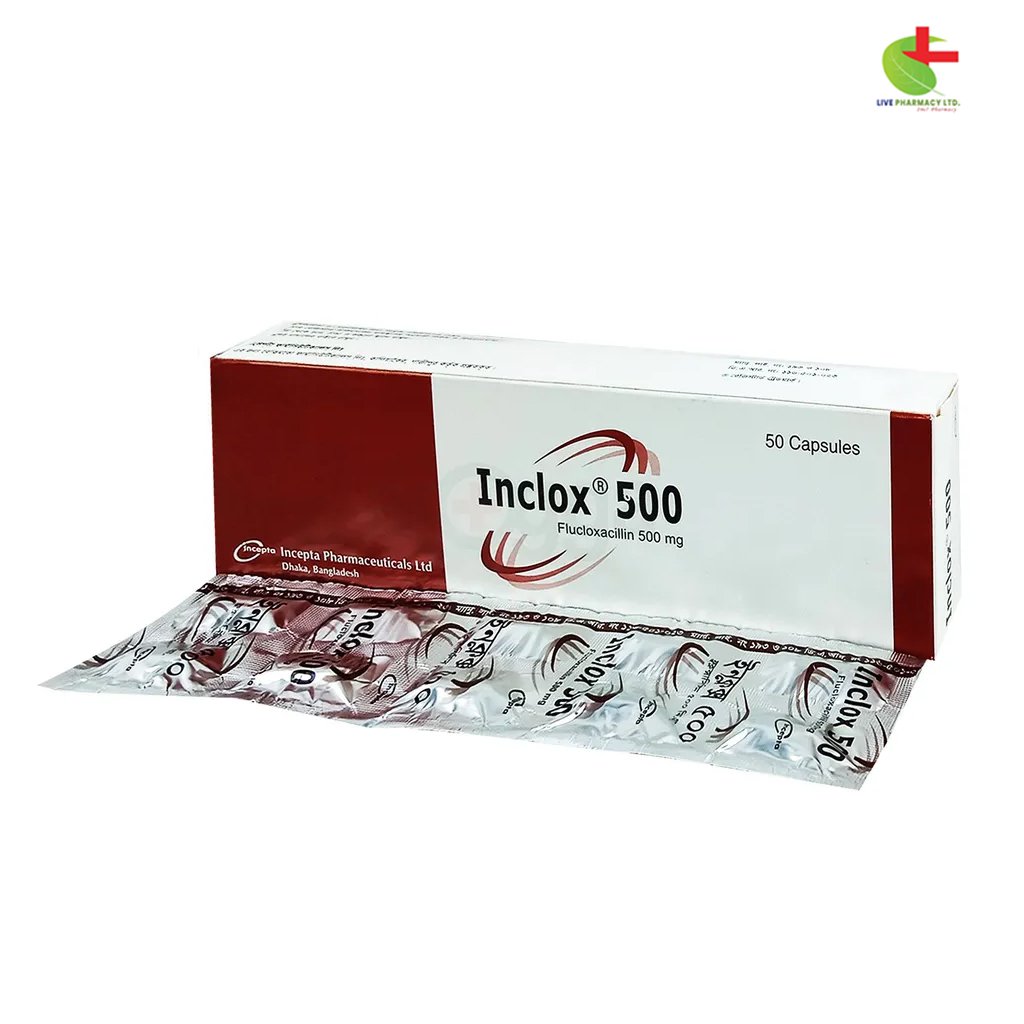Inclox 500
100.00৳ Strip
- Inclox is an effective antibiotic for treating infections caused by Gram-positive bacteria, including penicillin-resistant strains.
- Indicated for skin infections, respiratory tract infections, osteomyelitis, and more.
- Works by inhibiting bacterial cell wall formation, leading to bacterial cell death.
- Unique formulation ensures optimal absorption and efficacy in managing infections.
- Always follow your healthcare provider’s instructions for safe and effective use.
 Brand
Brand
|
Incepta Pharmaceuticals Ltd |
|---|---|
 Generics
Generics
|
Flucloxacillin Sodium |
 Type
Type
|
Capsule |
Indications
Inclox is used for treating infections caused by Gram-positive bacteria, including those from penicillinase-producing staphylococci. It is indicated for:
- Skin and Soft Tissue Infections: Boils, abscesses, carbuncles, infected skin conditions (such as ulcers, eczema, acne, furunculosis, cellulitis, infected wounds, and burns), otitis media and externa, and impetigo.
- Respiratory Tract Infections: Pneumonia, lung abscesses, empyema, sinusitis, pharyngitis, tonsillitis, and quinsy.
- Other Infections: Osteomyelitis, enteritis, endocarditis, urinary tract infections, meningitis, and septicemia due to Inclox-sensitive organisms.
- Prophylaxis: Used during major surgical procedures, such as cardiothoracic and orthopedic surgeries, as needed.
Pharmacology
Flucloxacillin is a fibric acid derivative effective against Gram-positive organisms, particularly those resistant to penicillin. It works by inhibiting bacterial cell wall formation. As an isoxazolyl penicillin, it offers resistance to hydrolysis by penicillinase and maintains stability in gastric acid. Flucloxacillin is bactericidal, especially effective against penicillinase-producing staphylococci, by disrupting peptidoglycan synthesis, which is essential for bacterial cell wall integrity.
Dosage
Oral Administration:
- Adults: 250 mg four times daily; may be doubled for severe infections. For osteomyelitis and endocarditis, up to 8 g daily in 6-8 hour intervals.
- Children (2-10 years): Half of the adult dose.
- Children (Under 2 years): One-quarter of the adult dose.
Parenteral Administration:
- Adults/Elderly:
- Intramuscular Injection: 250 mg four times daily.
- Intravenous Injection: 250 mg-1 g four times daily, given slowly over 3-4 minutes or via infusion.
- Children:
- 2-10 years: Half of the adult dose.
- Under 2 years: One-quarter of the adult dose.
Always follow your healthcare provider’s instructions.
Administration
Oral doses should be taken one hour before meals.
Interactions
Concurrent use with other medications may lead to prolonged blood levels of Inclox.
Contraindications
Flucloxacillin is contraindicated in patients with a known hypersensitivity to penicillin.
Side Effects
Common side effects include gastrointestinal issues like nausea, vomiting, diarrhea, and dyspepsia. Other potential effects are rashes, urticaria, purpura, fever, interstitial nephritis, hepatitis, and cholestatic jaundice.
Pregnancy & Lactation
Flucloxacillin is classified as Category B by the US FDA. It should only be used during pregnancy if necessary, as animal studies do not always predict human outcomes. It is excreted in breast milk, so caution is advised for nursing mothers.
Precautions & Warnings
Caution is recommended for patients with liver dysfunction and those with a history of allergies.
Use in Special Populations
In cases of severe renal failure (creatinine clearance <10 ml/min), consider adjusting the dose or extending the dosing interval.
Therapeutic Class
Penicillinase-resistant penicillins.
Reconstitution
Inclox may also be used in various routes, such as intraarticular and intrapleural injections, typically at doses of 250-500 mg daily. For inhalation via nebulizer, dissolve 125-250 mg in 3 ml of sterile water.
Storage Conditions
Store in a dry place, away from light and heat. Keep out of reach of children.













Reviews
There are no reviews yet.